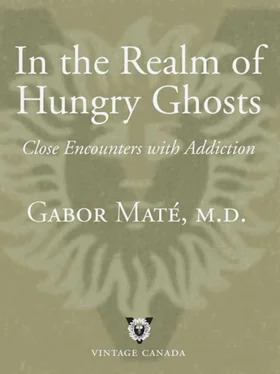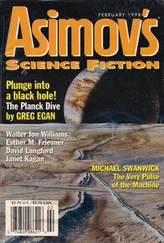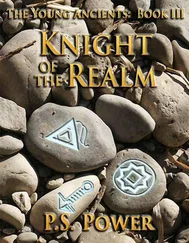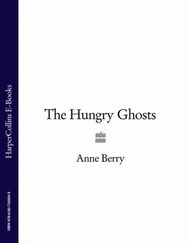I, too, have had a tendency to look to outside sources of solace such as work and binge buying when there have been strains in my marriage—even when these strains originated in my own underdeveloped self-regulation and lack of basic differentiation.
These, then, are the traits that most often underlie the addiction process: poor self-regulation; lack of basic differentiation; lack of a healthy sense of self; a sense of deficient emptiness; and impaired impulse control. The development of these traits is not mysterious—or, more correctly, there is no mystery about the circumstances under which the positive qualities of self-regulation, self-worth, differentiation and impulse control fail to develop. Any gardener knows that if a plant hasn’t grown, most likely the conditions were lacking. The same goes for children. The addictive personality is a personality that hasn’t matured. When we come to address healing, a key question will be how to promote maturity in ourselves or in others whose early environment sabotaged healthy emotional growth.
CHAPTER 22

Poor Substitutes for Love: Behavioural Addictions and Their Origins
Drug addicts have a limited stock of substances to choose from: they have fewer escape routes than those available to behavioural addicts. As a physician colleague in the Downtown Eastside put it: “They just have less in their kitbags than the rest of us.” By comparison, the possibilities for behavioural addictions are almost infinite. How, then, is the “choice” made? Why self-improvement or blogging in my son’s case and why sex or gambling for someone else? Why does buying compact discs set my dopamine circuits into action and why compulsive work? I put that question to Dr. Aviel Goodman, the authority on sexual addictions I’ve mentioned in earlier chapters. “It has a lot to do with which experience brings relief from whatever pains us,” he said. “For a lot of people something like compact discs would not be high on the list, but my guess is that music means something deep for you, that for you it’s a profound emotional experience.”
And why might that be the case? “First, you may have a genetic sensitivity toward music,” Dr. Goodman suggested, “and you may have been affected by the kind of music your parents listened to. But there could have been earlier influences—for example, whether in infancy you were often left in a room where you weren’t cuddled but you were able to hear, so your auditory system became an important conduit of emotional connection with the world.”
This Minnesota psychiatrist, who knew nothing about my background, came close to describing my early experience as I understand it.
I was born in Budapest in 1944, to Jewish parents, two months before the Nazis occupied Hungary. We endured the well-known set of calamities that war and genocide brought upon the Jews of Europe. For the first fifteen months of my life my father was away in a forced labour camp and for most of that time neither of my parents knew whether the other was alive or dead. I was five months old when my grandparents were killed at Auschwitz. Many years later, not long before her own death at age eighty-two in Vancouver, my mother told me that she was so depressed after her parents’ murder that some days she got out of bed only to look after me. I was left alone in my crib quite often. I related some of this history in Scattered Minds:
Two days after the Germans marched into Budapest, my mother called the pediatrician. “Would you come to see Gabi,” she requested, “he has been crying almost without stop since yesterday morning.” “I’ll come, of course,” the doctor replied, “but I should tell you: all my Jewish babies are crying.”
Now, what did Jewish infants know of Nazis, World War II, racism, genocide? What they knew—or rather, absorbed—was their parents’ anxiety…. They inhaled fear, ingested sorrow. Yet were they not loved? No less than children anywhere.
When, owing to internal demons arising from their own childhoods or to external stressors in their lives, parents are unable to regulate—that is, keep within a tolerable range—the emotional milieu of the infant, the child’s brain has to adapt: by tuning out, by emotional shutting down and by learning to find ways to self-soothe through rocking, thumb-sucking, eating, sleeping or constantly looking to external sources of comfort. This is the ever-agitated, ever-yawning emptiness that lies at the heart of addiction.
In the unbelievably overcrowded and unsanitary conditions of the Jewish ghetto of Budapest towards the end of the war, I became so ill that my mother feared I might die of disease or malnutrition. In my twelfth month, she had me smuggled out to relatives who lived in hiding outside the ghetto. When she went out to the street to hand me to the kind but completely unknown Gentile visitor who was to take me away, she didn’t know whether she would survive to the next day, let alone see me again. My relatives were caring people who looked after me as best they could, but I have to imagine that to a year-old infant, they were complete strangers. The small child’s natural response to overwhelming emotional loss is a defensive shut-down. I’ve had a lifelong resistance to receiving love—not to being loved or even to knowing intellectually that I am loved, but to accepting love vulnerably and openly on a visceral, emotional level. People who cannot find or receive love need to find substitutes—and that’s where addictions come in.
Music gives me a sense of self-sufficiency and nourishment. I don’t need anyone or anything. I bathe in it as in amniotic fluid; it surrounds and protects me. It’s also stable, ever-available and something I can control—that is, I can reach for it whenever I want. I can also choose music that reflects my mood, or if I want, helps to soothe it. As for forays to Sikora’s, music-seeking offers excitement and tension that I can immediately resolve and a reward I can immediately attain—unlike other tensions in my life and other desired rewards. Music is a source of beauty and meaning outside myself that I can claim as my own without exploring how, in my life, I keep from directly experiencing those qualities. Addiction, in this sense, is the lazy man’s path to transcendence.
The sources of my work addiction are clear to me. No matter how much she loves him in her heart—and my mother loved me with all of hers—a child with a depressed mother feels constant deprivation and deep distress. An eleven-month-old must sense a cataclysmic rupture in the order of things when he is given over to strangers and his mother abruptly disappears from his life. These sorts of experiences can also leave a deep impression in the psyche and create alterations in brain physiology that may—but do not necessarily, as we shall see—last a lifetime.
My sense of worth, unavailable to me for who I am , has come from work. And in the practice of medicine I found the perfect venue to prove my usefulness and indispensability. For a long time it was impossible for me to turn down work—the drug of being wanted was far too powerful to refuse and, in any case, I needed the flame of constant preoccupation to ward off the anxiety or depression or ennui that always lurked at the edges of my psyche. Like any addict, I used my addictions to help regulate my moods, my internal experience. On weekends when the beeper fell silent I felt empty and irritable—the addict in withdrawal.

The same dynamics come into play with eating disorders. How, we might ask, could an activity essential for survival become so distorted, undermining a person’s health, sometimes to the point of shortening a person’s life? Although it is commonplace to blame the current epidemic of obesity on junk food consumption and sedentary living, these are only the behavioural manifestations of a deeper psychological and social malaise.
Читать дальше














